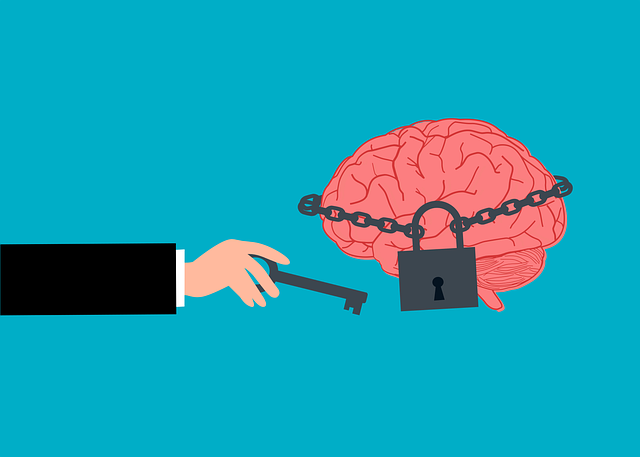Mood regulation strategies encompass a holistic approach, linking emotions and self-worth through therapy for self-esteem that addresses low self-esteem issues causing mood swings. Community outreach programs educate individuals on emotion recognition and management, promoting positive interactions and self-compassion to enhance emotional resilience. Cognitive Behavioral Therapy (CBT), an evidence-based method, controls negative thought patterns with positive, realistic thoughts, treating depression, anxiety, and stress disorders while fostering resilience and personalized care. Mental wellness coaching programs tailored to individual needs build resilience, refine communication skills, and teach healthy coping mechanisms, developing a positive inner dialogue for improved self-esteem and mental wellness. Stress management techniques like mindfulness, meditation, and yoga offer outlets for tension and foster self-awareness to manage emotional triggers effectively.
Mood regulation strategies are essential tools for managing emotional well-being. In this article, we explore effective methods to stabilize moods and boost self-esteem. From understanding the fundamental connection between mood and self-worth to leveraging evidence-based practices like Cognitive Behavioral Therapy (CBT), we provide insights into navigating emotional challenges. Additionally, discover alternative approaches that go beyond traditional therapy for self-esteem, offering a holistic perspective on achieving lasting emotional balance.
- Understanding Mood Regulation and Self-Esteem Connection
- Cognitive Behavioral Therapy for Effective Mood Management
- Alternative Approaches to Boost Self-Esteem and Stabilize Moods
Understanding Mood Regulation and Self-Esteem Connection

Understanding Mood regulation strategies involves recognizing that our emotions are closely tied to our sense of self-worth and identity. Low self-esteem often manifests as unpredictable or intense mood swings, making it a crucial aspect to address in therapy for self-esteem. When individuals feel negative about themselves, they may struggle with emotional regulation, leading to challenges in their daily lives. By targeting self-esteem issues through therapeutic interventions, one can significantly improve emotional resilience and overall well-being.
Community outreach program implementation that focuses on empathy building strategies can play a pivotal role in fostering healthy mood regulation. These programs aim to educate individuals on recognizing and managing their emotions effectively while promoting positive interactions with others. Through group discussions and activities, participants learn valuable coping mechanisms, gain insights into emotional triggers, and develop better self-compassion—all essential components for enhancing emotional regulation and building stronger connections within communities.
Cognitive Behavioral Therapy for Effective Mood Management

Cognitive Behavioral Therapy (CBT) is a highly effective therapy for self-esteem and mood management. It helps individuals identify and challenge negative thought patterns, replacing them with more positive and realistic ones. By focusing on the connection between thoughts, feelings, and behaviors, CBT enables people to gain control over their emotional responses, thereby improving their overall mood regulation. This therapeutic approach is backed by extensive research, demonstrating its success in treating various mental health conditions, including depression, anxiety, and stress-related disorders.
One of the key strengths of CBT lies in its ability to foster resilience building and cultural sensitivity in mental healthcare practice. It encourages individuals to explore their unique experiences and perspectives, ensuring that therapeutic strategies are tailored to meet their specific needs. Additionally, by teaching effective coping mechanisms and stress reduction methods, CBT equips people with valuable tools to navigate life’s challenges, enhancing their overall well-being.
Alternative Approaches to Boost Self-Esteem and Stabilize Moods

Beyond traditional therapy for self-esteem, there are alternative approaches that can effectively boost your sense of self-worth and stabilize moods. One such method is mental wellness coaching programs. These tailored programs focus on developing resilience, enhancing communication strategies, and promoting healthy coping mechanisms. By addressing underlying beliefs and thought patterns, coaches help individuals cultivate a more positive inner dialogue, which in turn boosts self-esteem and overall mental wellness.
Additionally, stress management techniques play a pivotal role in mood regulation. Incorporating practices like mindfulness, meditation, or yoga can significantly reduce stress levels and create a sense of calm. These activities not only provide an outlet for tension but also foster self-awareness, enabling individuals to better understand their emotional triggers. When combined with effective communication strategies, these alternative approaches offer comprehensive tools for navigating life’s challenges and maintaining emotional equilibrium.
Mood regulation strategies, particularly Cognitive Behavioral Therapy for Self-Esteem and alternative approaches, offer powerful tools to manage emotions effectively. By understanding the connection between mood and self-esteem, individuals can enhance their overall well-being. These techniques provide a comprehensive framework to navigate emotional challenges, ultimately fostering stability and resilience in daily life. Incorporating these strategies into personal routines can lead to significant improvements in mental health and a more positive outlook.














